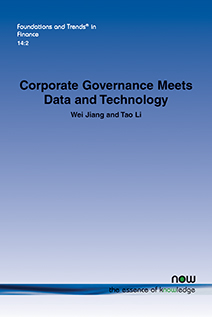Corporate Governance Meets Data and Technology
By Wei Jiang, Asa Griggs Candler Professor of Finance, Goizueta Business School, Emory University, USA, wei.jiang@emory.edu | Tao Li, Bank of America Associate Professor of Finance, Warrington College of Business, University of Florida, USA, Tao.Li@ufl.edu
Abstract
Corporate governance encompasses a set of processes, customs, policies, laws, and institutions that affect how a corporation is directed, administered, or controlled. Technology both enhances and disrupts the traditional board-centric corporate governance system, enhancing efficiency and transparency while introducing new challenges and risks. In this work we examine three key themes comprehensively: the redefinition of information and information asymmetry through the generation of and access to big data; blockchain technology’s transformative potential for aggregating preferences and exercising shareholder voting rights while blurring the line between securities and tokens; and the impact of smart contracts and their underlying infrastructure on the expansion of contracts and the implementation of decentralized governance through decentralized autonomous organizations. These innovative technological solutions empower stakeholders to exercise governance rights effectively, but their complexity also gives rise to new barriers and inequalities. As technology evolves, collaboration among researchers, policymakers, and practitioners is imperative to ensure that corporate governance remains effective and responsive to the current dynamic business environment.
Corporate Governance Meets Data and Technology
Corporate governance encompasses the processes, policies, and institutions shaping how corporations are directed and controlled. Technology plays a dual role in this context, enhancing traditional governance systems while introducing novel challenges and risks. Corporate Governance Meets Data and Technology explores this intersection through three main themes: the impact of big data on information asymmetry, blockchain's potential to transform shareholder rights and ownership structures, and the implications of smart contracts for decentralized governance. These innovations empower stakeholders with new tools for effective governance but also raise concerns about complexity and inequalities.
As technology evolves, collaboration among researchers, policymakers, and practitioners becomes crucial to adapt corporate governance to the dynamic business landscape. Addressing these issues in-depth provides valuable insights into the future of governance in a technology-driven world, highlighting both opportunities for efficiency and transparency, and challenges related to security, fairness, and regulatory frameworks.
